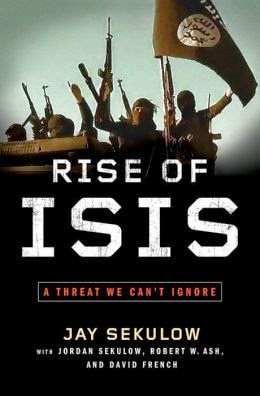In this fascinating book, Johnson (Where Good Ideas Come From) presents a “history of ideas and innovation,” focusing on six important technical and scientific innovations that have shaped the modern world but that we often take for granted. The book reveals what Johnson calls “the hummingbird effect,” when “an innovation... in one field ends up triggering changes that seem to belong to a different domain altogether.” … Johnson debunks the genius theory of innovation—the romantic idea of the lone inventor who changes history—arguing instead that ideas and innovations emerge from “collaborative networks” at the intersections of different domains. He says that this understanding is crucial to “see more clearly the way new ideas come into being, and how to cultivate them as a society.”
Rise of ISIS: A Threat We Can't Ignore by Jay Sekulow with Jordan Sekulow, Robert W. Ash and David French
Jay Sekulow, one of America's most influential attorneys, closely examines the rise of the terrorist groups ISIS and Hamas, explains their objectives and capabilities and how, if left undefeated, their existence could unleash a genocide of historic proportions.
Rise of ISIS gives a better understanding of the modern face of terror, and provides an overview of the laws of war and war crimes. These laws differentiate between the guilty and innocent, and explain why the US military and the Israeli Defense Forces are often limited in their defensive measures.
A must-have for anyone who wants to better understand the conflict that exists in the middle east, this well-researched and fully annotated volume is invaluable in revealing how this new brand of terrorism poses a very real threat to Americans and the world at large. It also serves as a guide to what we as individuals - and as a nation - can do to stop this escalating violence, prevent jihad, and protect Israel and America from this imminent threat.
The Short and Tragic Life of Robert Peace: A Brilliant Young Man Who Left Newark for the Ivy League by Jeff Hobbs
Nowadays there is reporting aplenty on the theme of two Americas. The originality of Jeff Hobbs's work lies in finding a man who lived simultaneously in both countries, who thrived and failed at the same time, who escaped his past and didn't…That one man can contain such contradictions makes for an astonishing, tragic story. In Hobbs's hands, though, it becomes something more: an interrogation of our national creed of self-invention…As a page turner alone, the story wins. It doesn't need further selling…What is worth adding is that the book will be highly provocative, even irritating, to those who answer the problems of the American underclass with prefab ideological theories and solutions.
The Innovators: How a Group of Hackers, Geniuses, and Geeks Created the Digital Revolution by Walter Isaacson
It’s no secret that people are often erased from the history of big-tech companies. It’s so prevalent in Silicon Valley that it is known as “The Creation Myth.” But what may come as a surprise is the number of women who played a pivotal role but who are now forgotten.
In many respects, the book could have been called “The Collaborators.” Each chapter reinforces the core premise that Mr. Isaacson made after 15 years of research: That every technology innovation, whether programming code, transistors, personal computers or the Internet, was built by groups of people (usually by borrowing from past ideas).
But while a number of the men have become celebrities, most of the women are lost in a distant fog.
Ms. Lovelace’s role in tech, for example, is so paramount that her story is the opening and closing chapter. An English mathematician and writer, she wrote the first-ever computer algorithm, put forth the idea that humanities and technology should coexist and dreamed up the concept of artificial intelligence.
Part of the problem, Mr. Isaacson writes in “The Innovators,” is how the creation myth seeks to make heroes out of individuals, rather than the group. And when the contribution of the collective is ignored, it is usually a man who gets the credit.





No comments:
Post a Comment